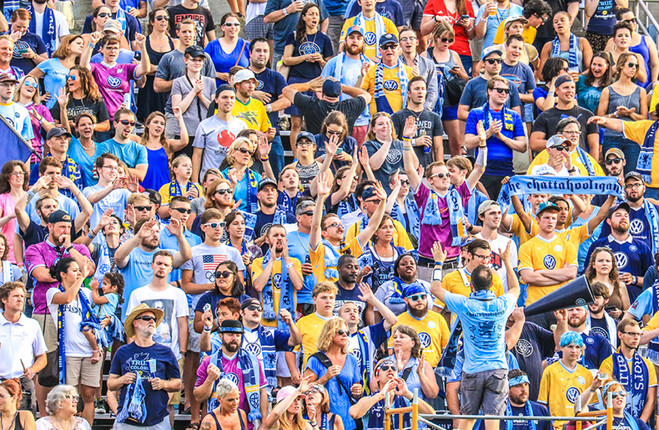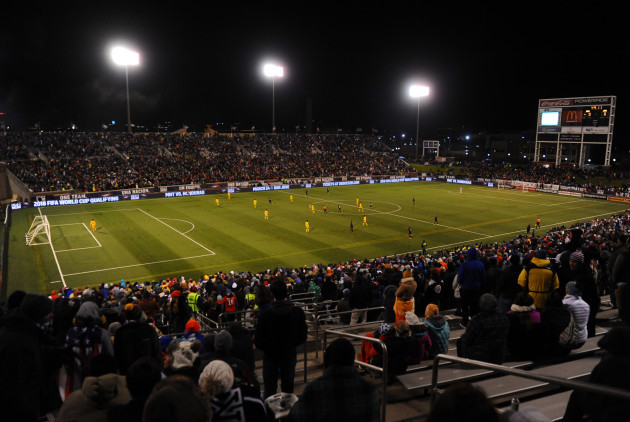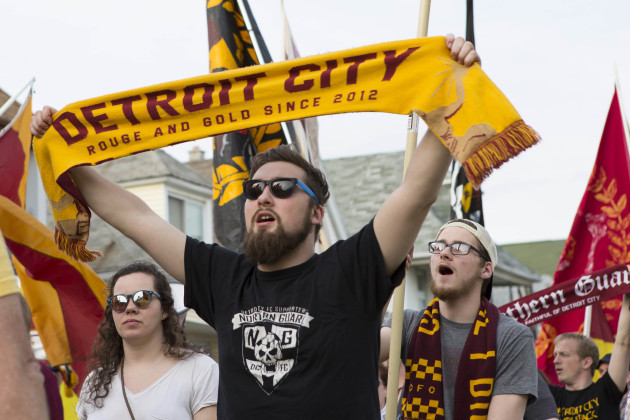LAST UPDATE | 7 Apr 2019
IT WAS A battle for Major League Soccer to survive.
After its sixth season and with teams haemorrhaging money, it very nearly folded completely. Two franchises – in Tampa Bay and Miami – ceased operations in 2001 and just 12 organisations remained. The league was $250 million in the red and average attendance had fallen almost 20% since the very first day back in 1996.
The plan was simple: ask the rich owners to help bankroll the other sides. They did and MLS managed to cling on. Then it began to turn a corner and later flourished. Now, with 24 teams and a relentless expansion strategy (David Beckham’s Miami-based outfit and Nashville SC will both be in place next year), it represents a real success story. But, there’s one major issue: the lack of promotion and relegation.
It means that any MLS owner is impenetrable and their investment well-protected. And without a properly tiered system – which gives any club a shot at reaching the big leagues some day – it’s very much a closed shop. The expansion fee for any new MLS team is over $150 million and there’s also the requirement of a soccer-specific stadium in any deal. So, even though a team may have a hardcore fanbase, some exciting talent and big dreams, they’ll never get to the very top without the deep pockets of some very wealthy businessmen.
The subject has divided opinion for a long time. Some acknowledge that the biggest priority for MLS was simply to ensure teams had a professional league to play in and that – like so many other major leagues – they greased palms with corporate America and subsequently reaped the rewards. It was just smart business. But, for many others, it spoils the landscape and goes against every other league system in the world. And, for the purists, it also means a further disconnect between community and club. And for some communities, they’ve made huge advances in building the connection.
Like Chattanooga FC. They play in the National Premier Soccer League, effectively a semi-pro environment that’s down the totem pole. But, like many other small enterprises, they have potential and are making waves by doing things differently.
In the NPSL, some sides have tapped into an incredible fanbase. For instance, in the case of Detroit FC, it’s pretty common for them to attract over 5,000 to games. Similarly, Chattanooga’s support has led to a three-year deal with the 20,000-capacity Finley Stadium to host their home fixtures. They want to be a full-time professional team so to raise funds, draw wider interest and appeal to those with a fan-first mentality, Chattanooga are offering shares to anyone who wants them.
For a basic price of $125, an investor will receive a vote, a stock certificate, an invitation to the annual shareholders’ meeting and their name (along with other shareholders) printed on the team’s away shirt. And, there are some quirky bonuses too, like a lapel pin and yard sign. It’s coming up on three months since the campaign was launched via WeFunder and $653,250 has been pledged so far by 2,373 people across every state in the US and over 20 countries, including Ireland.
“It was the end of our second season and we were just having a beer with our fan group here and one of them brought up the idea, which we hadn’t really considered at that point,” says Tim Kelly, who’s the club chairman.
“But we started putting the pieces together. We’d (a group of local entrepreneurs) started the club from scratch and are completely dedicated to the city. It’s an interesting place with a strong sense of community and when the lightbulb went on, we set out trying to investigate ways of doing it. We had some friends who were Green Bay Packers shareholders so we read their prospectus. I know just about enough of the law to be dangerous so we spent a little money with attorneys to see if it was possible. But at that stage, around 2011, it really wasn’t without spending half a million dollars in legal fees. It wasn’t until the Jobs Act passed in 2016 that it became possible to do this. The whole idea was to democratise capital in the US and allow direct investment in smaller companies, where before you needed to go to an investment bank.”
Flattered as we are by all of the international attention, the idea is really to chain the team to the local community as much as possible. Almost two-thirds of the dollar volume is local but a lot of folks have bought a single $125 share because it’s a cool idea and they like the notion of owning a football team. And, most importantly, we’re happy to have them.”
The support for the campaign in the US is understandable. Chattanooga FC represent something radical. They, along with many others, want an open system with promotion and relegation. They want to push forward and not stagnate. They want to make noise. And, considering modern football ownership and the growing separation between clubs and fans, Chattanooga’s plan also appeals to supporters around the world who are weary of the ruthlessness of the modern game.
“It’s bad enough world-wide but at least the rest of the world has promotion and relegation,” Kelly says.
“In German football, they mandate 51% of fan ownership. It’s odd that in American culture that it’s become demonised or seen as anti-capitalist or worse but public ownership is exactly what it sounds like. It’s no different than buying shares in Amazon or anything else for that matter. The American sports landscape is definitely an oligarchy. It’s a club of very, very rich people. It’s a very closed club and we stand in fairly stark opposition to that model, honestly.”
What we can tell and what we’ve heard from all of these investors is that there’s a significant portion of American soccer fans who would like to see promotion/relegation come to this country so we can have an open system like the rest of the world has. We’re in the process of building out a league that’s a non-franchise/open-system model and we can function perfectly well financially without that. But I think if we can capitalise properly on the public’s support and if we had the opportunity to move up then we’d have a very good chance of doing that.”
Later this year, 10 of the bigger NPSL teams, including Chattanooga, Detroit (who have gone full-time this season), the New York Cosmos and Miami FC, will compete in the Founders Cup, which the club owners hope will generate widespread interest, showcase talent and lead to a pro league possibly beginning in 2020. It’s admirable grassroots stuff but because of the fragmented football system in the US, it’s hard to know where it will lead. The current structure is supported by the behemoth billionaires who understandably enjoy MLS’ private playground.
But Kelly believes change is inevitable.
“There’a a lot of money and power behind the current system,” he says.
“There’s a lot of people that would be financially harmed if that system breaks down. But there are a lot more people who would benefit from an open system. Part of this is getting us financially healthy enough to be able to make it through and as long as we have interesting games to play – which are revenue events for our fans – then we can be fine. Fifa has been quite clear that at some point the US will have to conform but until that time we’ll keep doing our thing.”
Fan ownership is a community in itself and Chattanooga now find themselves part of a unique club, which might lead to some interesting plans further down the road.
“We’ve thought quite a lot about that and we have a good relationship with Wolfsburg because there’s a large Volkswagen plant here, which is where that relationship began,” Kelly says.
“We have a relationship – of modest but meaningful cross-investment – with Exeter City but they’re supporter-owned too and were really helpful. We spoke with them at length in terms of things to focus on and avoid. We like the idea of expanding the model with international partners. Chattanooga is quite a popular tourist destination in the southeast. It’s in a beautiful area at the southern tip of the Appalachian Mountains and the Tennessee River flows through here. So, it’s an added benefit that we might have some soccer tourism. But I might add that this is among the most unlikely places for soccer to be popular because we’re in the middle of a very traditional Bible Belt, where American football is extremely popular.
So if soccer can make it here, it can make it anywhere in the US.”
- Originally published at 09.30
Murray Kinsella and Andy Dunne dissect Ireland’s disappointing Six Nations campaign, and discuss the pros and cons of rugby’s new law proposals in the latest episode of The42 Rugby Weekly:
The42 Rugby Weekly / SoundCloud



